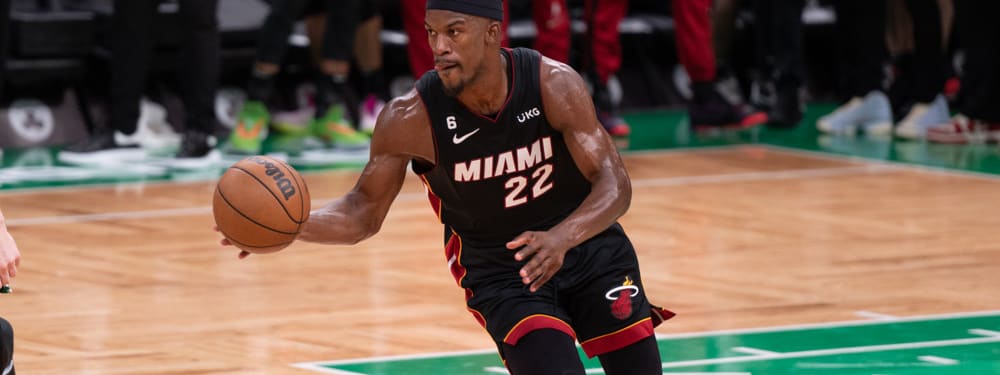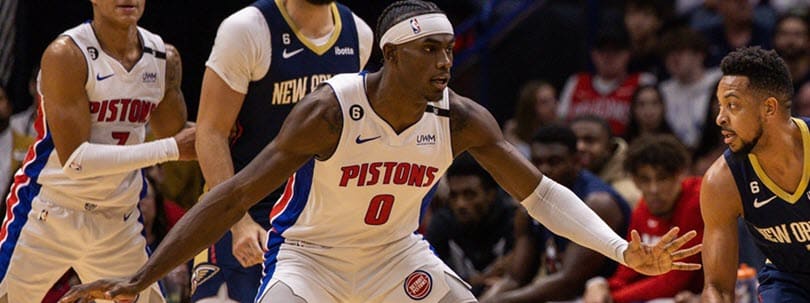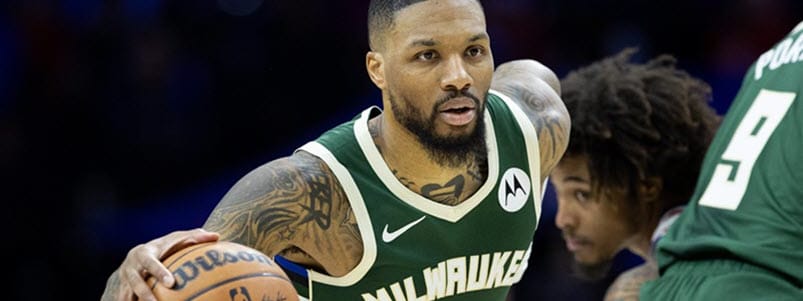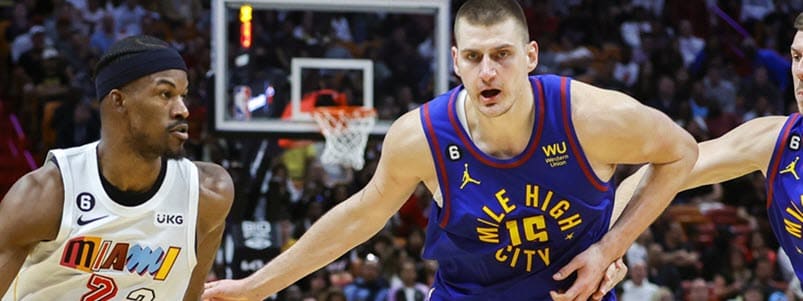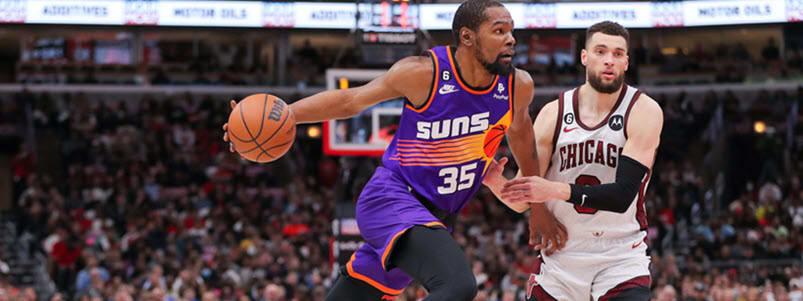Recent RotoWire Articles Featuring Jimmy Butler
See More
While Butler is known for his incredible playoff performances, his regular-season production is still pretty stellar. In 2022-23, he averaged 22.9 points, 5.9 rebounds, 5.3 assists and 1.8 steals in 33.4 minutes across 64 games. He doesn't provide much three-point volume, as he attempted just 1.6 per contest last year. However, his 53.9 percent shooting from the field and 85.0 percent shooting on 8.7 free-throw attempts per game are both elite marks. Butler provides quality all-around production, including on the defensive end. The star forward hasn't played more than 65 games since 2016-17, but his lowest number of appearances in that span is 52 in a pandemic-shortened 2020-21 campaign. This consistency from Butler is helpful because fantasy managers know what to expect in terms of his game played. The losses of Gabe Vincent and Max Strus, combined with the additions of Josh Richardson and Thomas Bryant, are unlikely to affect Butler's production much. Overall, Butler is a safe fantasy option best suited for eight-category formats.
Butler had another regular season in which he missed a lot of time. He appeared in just 57 games, marking the third straight season in which he has failed to play at least 60 games. He hasn't topped 65 games since the 2018-19 season and hasn't played at least 70 games since he was a member of the Bulls. When he was on the floor last season, he was great, averaging 21.4 points, 5.9 rebounds, 5.5 assists and 1.5 steals per game. He was an asset with his percentages, shooting 48.0 percent from the field and 87.0 percent from the free-throw line. There are limitations to his game, though, such as him averaging exactly 0.5 three-pointers per game in each of the last three seasons. The Heat want to win a title, so they want to make sure Butler is healthy for when the playoffs roll around, not push him to play in as many games as possible during the regular season. That makes him a somewhat risky fantasy option since his name recognition alone will likely require managers to select him early in drafts if they want him on their squad.
Missed games continue to be a theme in Butler's career, but he had his best fantasy season on a per-game basis last season, finishing as the league's ninth-most productive player. In his 52 appearances, the veteran averaged 21.5 points, 7.1 assists, 6.9 rebounds and a league-high 2.1 steals in 33.6 minutes. He also shot a career-high 49.7 percent from the field. During the offseason, the Heat found some help for Butler, adding Kyle Lowry to the team's core. The addition of Lowry should alleviate some of Butler's playmaking and scoring responsibilities. As a result, it wouldn't be surprising to see Butler's points and assists take a slight dip. The change shouldn't be drastic, but fantasy managers shouldn't expect another career year from the 32-year-old. From 2014-15 to 2019-20, Butler finished between 13th and 23rd on a per-game basis in fantasy, which is a range he'll likely occupy again in 2021-22. Aggressive fantasy managers may take him at the end of the first round, but he should mostly get drafted in round two.
Butler put together an excellent campaign as the Heat's No. 1 option, averaging 19.9 points, career highs in both rebounds (6.7) and assists (6.0), 1.8 steals and 0.6 blocks. Injuries remained an issue for Butler, as he missed 15 games during the regular season and has played more than 70 games just twice in his nine-year career. Still, fantasy managers were rewarded with late second-round value -- on par with his typical production across the past five years. Butler's real-life stock is as high as ever after leading Miami to the NBA Finals against the Lakers and forcing six games, but from a fantasy perspective, it would be surprising if we saw the 31-year-old make any legitimate strides in his game. If anything, he might cede some responsibilities to the developing young core around him, including Bam Adebayo, Tyler Herro, Duncan Robinson and Kendrick Nunn. Conservative fantasy managers could understandably avoid Butler given his injury history, but he'll likely end up as a late-second or early third-round selection in most fantasy drafts.
Butler will be joining his fourth team in four years. He forced his way out of Minnesota after 10 appearances last season, finishing the year with the 76ers. While he missed out on the All-Star team for the first time since 2013-14, possibly due to his vehement trade demand, Butler played up to his standards during his age 29 season. His scoring dipped once arriving in Philly due to the wealth of talent around him, but he still managed 18.7 points, 5.3 rebounds, 4.0 assists and 1.9 steals in 2018-19. Now with the Heat, Butler is the clear-cut best player on the team, and he should control the offense. As a result, it's possible we see his usage rate hit highs we haven't seen since his final year in Chicago (26.5%). That season, he averaged 23.9 points on 16.5 shots, 6.2 rebounds, 5.5 assists and 1.9 steals. He did that in 37.0 minutes per game, however, and it's unlikely he'll see that much run in Miami considering he'll be 30 years old and no longer coached by Tom Thibodeau. Fantasy owners do need to take into consideration Butler's health. Since his age 24 season, Butler is averaging just 68.2 appearances per year. But ultimately, Butler appears to be en route for another All-Star-caliber season.
Butler was traded to the Timberwolves last summer and arrived in Minnesota as one of the league's biggest offseason additions. After a slow start to the season, Butler soon found his groove and started putting up the numbers Fantasy owners had become accustomed to in recent years. He finished his season as the team's leader in both scoring and steals, averaging 22.2 points and 2.0 steals per game, to go along with 5.3 rebounds and 4.9 assists. Despite the high-level production, Butler's season will likely be remembered for his knee injury, which came a ta key point in the season. The loss of Butler was felt immediately, and the team fell from the fourth seed to the eighth seed in the West within a matter of weeks. Although the Timberwolves were ultimately able to sneak into the playoffs as the eighth seed, they were quickly dispatched by Houston in Round 1. Looking ahead, Butler will again be locked in as the primary -- or perhaps co-primary -- option on offense, as well as the defensive anchor. Owners in most formats will have to part with a top-30 pick in order to secure Butler's services, and while he doesn't have the upside of the truly elite Fantasy commodities, Butler is about as safe as they come, though it's fair question whether he'll be able to stay healthy. The 29-year-old played in only 59 games last season -- his fewest since the lockout-shortened 2011-12 campaign-- and he's missed at least 15 contests in four of the last five seasons.
Butler, who arguably had the best season of his career during the 2016-17 campaign with the Bulls, is now a member of the Timberwolves. He was especially dominant after the All-Star break, posting 22.8 points, 6.6 assists, 6.0 rebounds and 2.0 steals across 37.7 minutes per game while shooting 46.2 percent from the field and 43.8 percent from deep. His emergence as a legitimate ballhandling threat and pseudo point guard elevated his game to new heights, increasing the number of ways he can rack up Fantasy points on any given night. While it’s unclear at the moment if that’s the role he’ll play with his new team, Jeff Teague, the Wolves’ point guard, is no slouch as a spot-up shooter. Butler even collected two triple-doubles last season and had an absolutely dominant performance against the Hornets where he dropped 52 points, 12 rebounds, six assists, three steals, one block and only two turnovers. Due to his recent overall play, the fact that he’s slated to be on a more talented roster, and his big-game potential, Butler should be seriously considered within the top 15 picks of any Fantasy draft.
Butler was named an All-Star for the second straight season in 2015-16, posting averages of 20.9 points, 5.3 rebounds, 4.8 assists and 1.6 steals in 67 games. While the Bulls failed to qualify for the postseason, Butler solidified his standing as one of the top two-way shooting guards in the league. Butler returns as the Bulls' unquestioned top player, but significant questions loom after Chicago added a pair of veteran guards in Dwyane Wade and Rajon Rondo in free agency. At age 34, Wade ranked fifth in the NBA in usage rate last season, while Rondo's propensity to dominate the ball is well documented. While both players have publicly backed Butler as the team's No. 1 option, it's fair to question how three below-average jump shooters will coexist in one backcourt. Butler shot a healthy 45.4 percent from the field last season, but converted only 31.2 percent of his three-point attempts, down from 37.8 percent in 2014-15. That number will have to improve this season for Butler's scoring production to maintain, as he figures to cede a decent portion of the offensive burden to Wade and Rondo. Butler's rebounding numbers will likely be sustainable, though with the addition of Rondo, it's difficult to imagine him topping -- let alone matching -- the career-best 4.8 assists per game he averaged last season.
Butler enters his fifth season in the NBA as an established star after an excellent 2014-15 season where he made the All-Star Team and won the NBA's Most Improved Player Award. Butler has always been known as a defensive stud, but he became a great all-around player last season as he averaged 20.0 points, 5.8 rebounds, 3.3 assists, 1.8 steals, 0.6 blocks, and 1.1 three-pointers in 39 minutes per game. Although he played a lot of minutes, Butler was only healthy enough to play in 65 games due to an elbow injury. He also improved all of his percentages from the previous season as he shot 46 percent from the field, 83 percent from the free-throw line, and 38 percent from behind the arc. His excellent season paid off big time as he signed a five-year max contract over the summer to remain with the team. The Bulls will rely on him heavily again this year, but it's possible he sees a little less playing time under new head coach Fred Hoiberg than he did under Tom Thibodeau as Thibodeau played his starters huge minutes. Hoiberg is expected to run a more up-tempo offense this year, something that should only help Butler as he excels in the open court and at getting to the rim. When asked by Hoiberg which position he plays, Butler said he thinks of himself as a point guard, so if Rose falls prey to another injury, don't be surprised if Butler simply takes on a more prominent role handling the ball.
Many expected Jimmy Butler to make a big leap forward last season, and while his production increased, his efficiency took a big hit in the process. Butler averaged 13.1 points, 4.9 rebounds, 2.6 assists, 1.9 steals, and 0.5 blocks in 39 minutes per game while playing in 67 contests. Now entering his fourth season, he'll look to improve upon his relatively unpolished offensive skill set while continuing to take on some of the toughest defensive assignments in the NBA. Thanks in large part to the mid-season trade of Luol Deng, he saw his minutes rise dramatically last season and was constantly relied upon by coach Tom Thibodeau to grind out games. With the increase in playing time, Butler increased his output, attempting 10.3 shots per game. In turn, he saw his field goal percentage fall below the 40 percent threshold. With the return of Derrick Rose and the addition of other scorers, there will be less pressure on Butler to force the issue on the offensive end. Depth issues plagued the Bulls last season and Butler was called upon to log an incredible amount of minutes for Chicago. While Butler may still be the workhorse on the wing, Thibodeau has significantly more capable options this season, including Tony Snell and European rookie Nikola Mirotic. As long as Butler continues to struggle offensively, he remains a lower-tier fantasy option unless your format values steals.
Many expected Jimmy Butler to make a big leap forward last season, and while his production increased, his efficiency took a big hit in the process. Butler averaged 13.1 points, 4.9 rebounds, 2.6 assists, 1.9 steals, and 0.5 blocks in 39 minutes per game while playing in 67 contests. Now entering his fourth season, he'll look to improve upon his relatively unpolished offensive skill set while continuing to take on some of the toughest defensive assignments in the NBA. Thanks in large part to the mid-season trade of Luol Deng, he saw his minutes rise dramatically last season and was constantly relied upon by coach Tom Thibodeau to grind out games. With the increase in playing time, Butler increased his output, attempting 10.3 shots per game. In turn, he saw his field goal percentage fall below the 40 percent threshold. With the return of Derrick Rose and the addition of other scorers, there will be less pressure on Butler to force the issue on the offensive end. Depth issues plagued the Bulls last season and Butler was called upon to log an incredible amount of minutes for Chicago. While Butler may still be the workhorse on the wing, Thibodeau has significantly more capable options this season, including Tony Snell and European rookie Nikola Mirotic. As long as Butler continues to struggle offensively, he remains a lower-tier fantasy option unless your format values steals.
Butler, selected 30th by the Bulls in last year's draft, saw minimal action as a rookie. He had a big Summer League campaign and is projected to take the departed Ronnie Brewer's defensive spark plug role off the bench this season. Look for him to see a major spike in playing time this year.
Butler, selected 30th by the Bulls in this year’s draft, averaged 15.7 points, 6.1 rebounds and 1.4 steals at Marquette last year. He played both forward positions in college, but his slight frame (6-8, 215) means he'll probably spend most of his time at the three in the NBA. He should spend most of this year on the bench, but an injury could clear the way for him to get some playing time.
